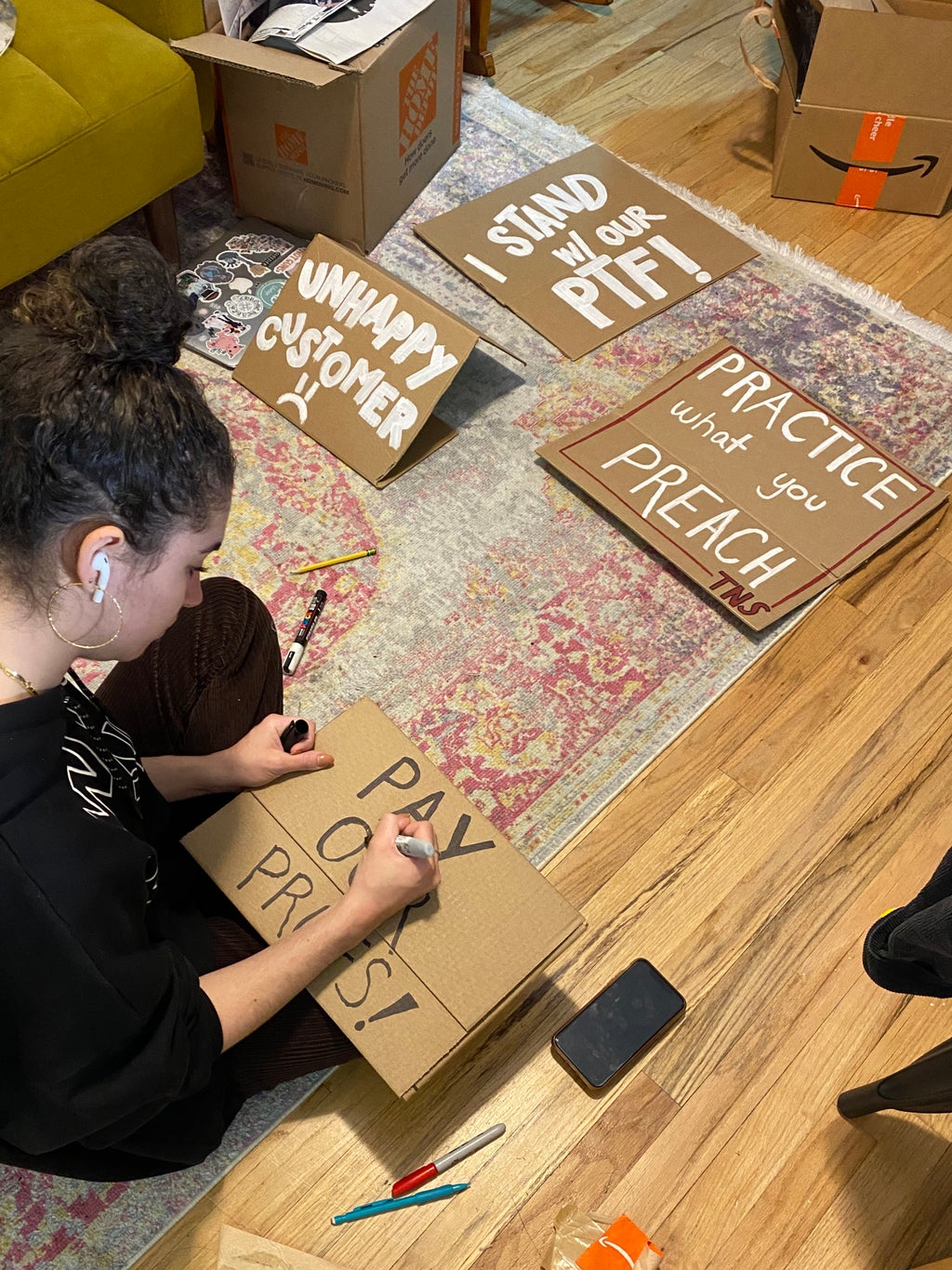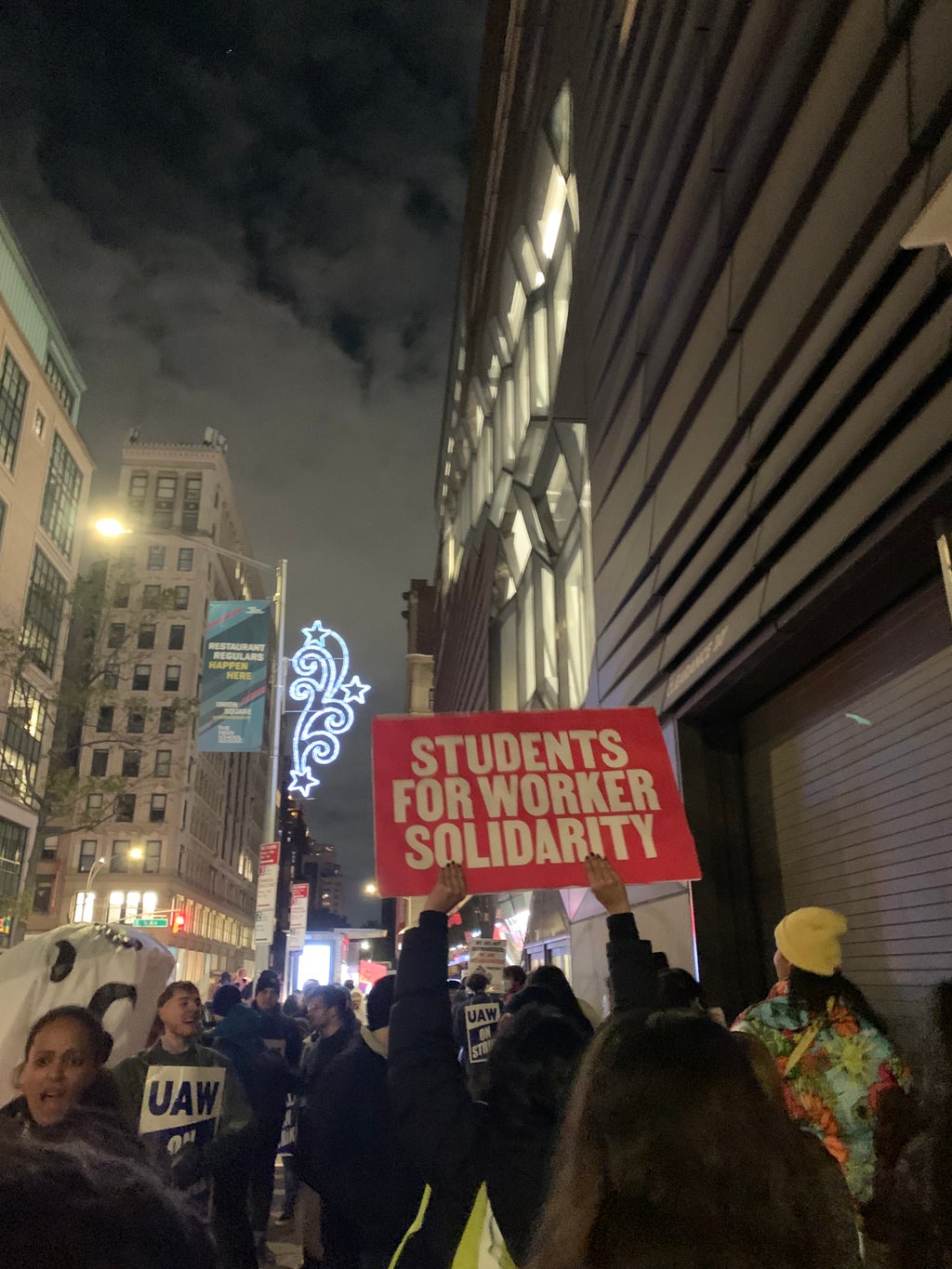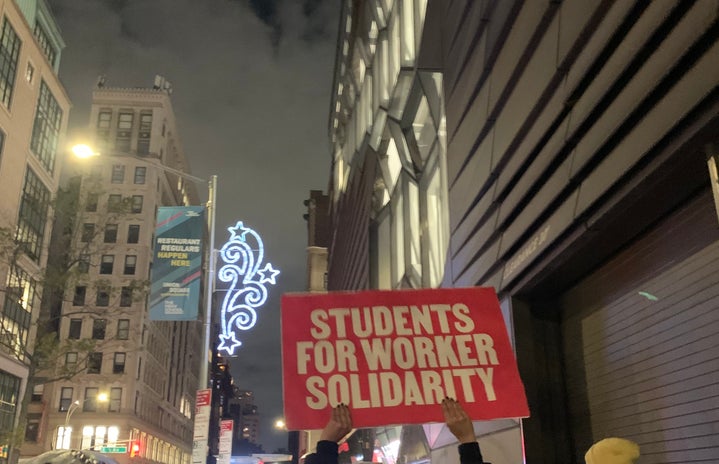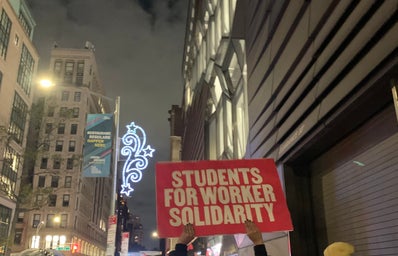All opinions expressed are those of the author, not of Her Campus.
Last week, after months of negotiations, to obtain better pay and working conditions, the New School’s part-time faculty went on strike. The university has failed to meet the part-time faculty’s demands for a fair contract, though negotiations are ongoing. Since 87% of the university’s professors are part-time, and the majority of full-time faculty are striking in solidarity, campus activity has ground to a halt.
Here is further information from The New School Free Press (the university’s student-run news organization), The New York Times, The New York Post, and The Gothamist.
Given the extensive press coverage of the mechanics and politics of the strike, these diary entries will instead explore personal experiences outside of the picket lines, providing individual, firsthand student accounts of living in a modern-day university-wide strike. This is part one of the series, written by Isabelle Bouvier.
Day 1
A few days ago when I saw that the strike had been approved and classes were canceled, I thought, f*ck, here we go again. For the second time in less than three years, school is canceled for the foreseeable future.
I let myself sleep in this morning. I’m reminded of the early days of Covid, the feeling that time was suspended, almost like some sort of Twilight Zone twist on a snow day, waiting for real life to resume. Of course these are different situations, but there are similarities. Every few minutes I refresh my email and check the relevant Instagram pages, looking for updates or messages from the administration that the union quickly refutes. Will this go on for a few days or a few weeks? No one knows and there’s not much of a point in guessing.
Last night my roommates and I made signs using markers from their Blick Parsons kits and cardboard from Amazon packages (that irony isn’t lost on me). After picketing for the entire afternoon shift, my roommates and I came home and made soup. I’m inspired but exhausted, invigorated but cold. My throat hurts from chanting so we put on a TV show and spend the night quietly relaxing.

Day 2
I wake up with a runny nose and worry that it’s Covid, even though it’s probably just from marching in the cold for hours. Either way, I’ll take a test and wear a mask.
My roommate—who works in the university’s Welcome Center—asks if we think it’s okay for her to pick up a shift that someone else gave up in honor of the strike. We want to do everything possible to support the union but we can’t necessarily give up our paychecks or risk our scholarships. Attending a private institution in such an expensive city is certainly a privilege, and we’re reliant on many campus resources. It’s hard to synthesize this. She decides to take the shift.
I meet a friend at the coffee shop in Shakespeare & Co. bookstore, hoping to finish a paper that was due before the strike started. Instead I listlessly scroll through TikTok while she wanders the bookshelves. We’ve learned about the ‘digital picket line,’ another layer of modern striking to add to already confusing circumstances. We’re not supposed to interact digitally with professors in any way, since that qualifies as labor: this includes emails, submitting work to Canvas, and attending classes on Zoom. As students, we are at a standstill. One of my full-time professors offered to hold class on Zoom because it won’t cross the physical picket line—but that disregards its whole intention. The digital aspect helps crystallize the meaning of a strike and what solidarity looks like.
Part of me wonders if it’s even worth finishing old assignments now. Still, my mom reminds me that the strike could be over any day and the final sprint of the semester will start immediately. Either way, I’m having a hard time drumming up motivation.
My friends and I text each other constantly:
What’re the odds this’ll be over next week? Should I pick up extra shifts at work?
Did you see the guy picketing in the Elmo costume?
Wait, what is the school talking about in their last email?
Stop sending me that photo of me at the strike, I hate it!
Are you keeping up with this week’s Psych readings?
Who’s going to the picket line tomorrow morning?
Day 3
My roommates and I have started sleeping till noon before bundling up for the afternoon/evening shift on the picket line.

Should we still be doing our homework? We ask each other. The truth is that a lot of us were behind in classes when the strike started—the combination of finishing midterms, promptly getting ready for finals, and seasonal affective disorder has us all burnt out. It doesn’t help that The New School doesn’t offer a single official day off in the fall semester until Thanksgiving Thursday (yup, even Indigenous People’s Day and Veterans’ Day). We’ve all been grumbling about this, desperate for a pause in the semester to catch our breath. But this isn’t quite what we had in mind.
This is something you’ll tell your kids about one day! People tell us.
Yeah, that and everything else that’s happened the last few years.
I wish I could talk to my journalism professor about these Strike Diaries. I pick her brain for every article I write and I am so grateful for her insight. But I can’t ask her to do any teaching work as long as the strike is on, so I’m relying on myself and the community of student writers around me. I know she’ll read this, though—hi!
Day 4
I work all day today and feel guilty that I can’t join the picket line. I hear the shouting from Sixth Avenue as I walk from the L train to my job in the West Village. I feel left out, but it’s almost a relief to spend the day doing something completely different, to allow myself to be distracted.
On my break, I see that NY-14 Congresswoman Alexandria Ocasio-Cortez reposted photos from our strike to her Instagram story. She didn’t write a caption; what we’re doing is big and important, but it isn’t anything new. People have always been talking about unjust labor practices and workers have always been striking. We’re simply writing another chapter in that legacy.
Day 5
No updates on contract agreements. The union organizers spent the day in an opening bargaining session with the university. In arguably my most pessimistic move yet, I ask my manager at work to give me more shifts for the foreseeable future. I go to bed early.
Day 6
We worry about our lost tuition. That’s no small thing. Will there be any kind of refund? I’m angry that we’re losing this money and I’m angrier that hardly any of it actually compensates our professors’ hard work. On the first day, one professor brought her two young children to the strike; they didn’t even look old enough to know what a union is. Beyond the textbooks, beyond the news articles we read about labor struggles—this is what it’s about. Those kids are counting on us to help protect their family’s livelihood.
We all want to be back in the classroom. Calling a strike was not an easy decision for the union to make, but things can’t continue as they are. We’ve missed a week of classes at this point. My mom texts me, Well, this is certainly an education in labor relations, negotiations, finance, etc.
No kidding, I reply, Talk about hands-on learning.
It’s the second day of the World Cup today. Good thing we’re not much of a sports school—we miss the games because we’re picketing. It feels good to be out there, though, making our voices heard.
The chief complaint of The New School’s student body is that we lack community; we don’t hold pep rallies or have a football team, and the colleges within the universities feel pretty separate from each other. But out in front of the University Center, waving our signs and shouting—this is also what community looks like. I’m proud to be a part of something; I’m proud of everyone out there fighting to get our professors what they deserve.
Live updates on Instagram:
@act_uaw7902: union of academic workers at NYU and The New School
@studentfacultysolidarity: student-led group supporting the union
@sens_uaw: union of academic student workers at The New School


